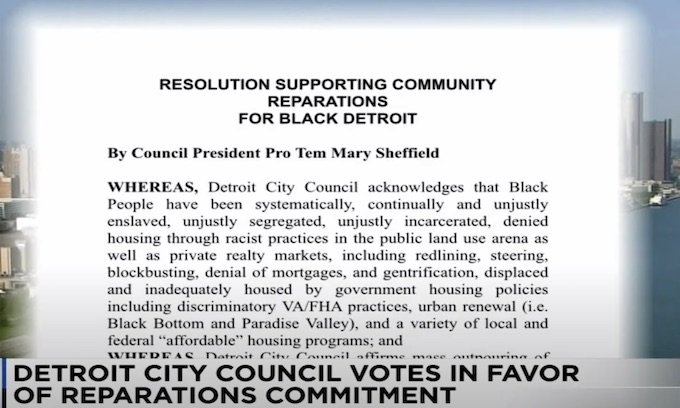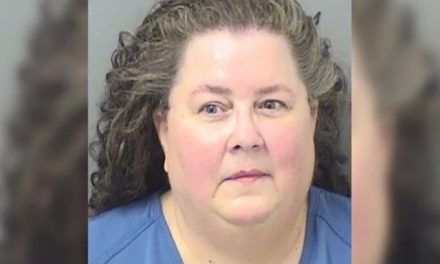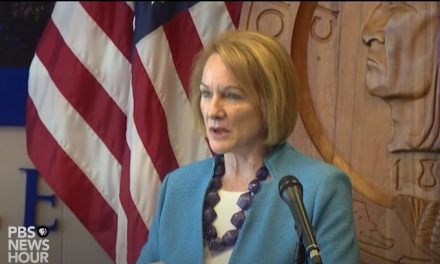Talk of reparations for African Americans over the country’s history of slavery has moved past conversations into action at the ballot box in Detroit, where the city may join a growing list of others nationwide to embrace the idea.
Activists and at least one of Detroit’s leaders are championing a Nov. 2 proposal that asks whether Michigan’s largest city should form a committee to consider reparations for residents, 77% of whom are Black. The committee eventually could advise ways to address a legacy of government systemic racism in the city, supporters said..
While the scope and details of Proposal R, if approved by voters, are not yet known, proponents say the initiative alone is a flash point for the city.
“Detroit is Ground Zero,” said Todd Perkins, an attorney who founded the People’s Voice, a nonprofit advocating for the proposal’s passage. “Being a predominantly African American city, there’s no better place to start than here.”
While other communities are pushing similar efforts, a victory in a city as large and steeped in civil rights as Detroit “would speak volumes about the fact that it can be a reality for African Americans in America and Americans in general,” Perkins said.
As Election Day nears, his group and others are canvassing neighborhoods and calling voters to generate support for the effort that, if passed, opens the door to exploring how Black residents would be compensated.
There is no organized opposition campaign to Proposal R. Duggan administration officials said the issue is best addressed at the federal level.
Critics of reparations argue such policies are too broad. When the Democratic-led U.S. House passed a form of the late Detroit U.S. Rep. John Conyers’ reparations legislation earlier this year, some opposing Republicans questioned a causal link between slavery and segregation, and the racial inequities of today.
Amid racial reckonings following the Black Lives Matter movement, the death in 2020 of George Floyd, the presidential election and the pandemic’s impact on minorities, supporters said they are optimistic residents will be receptive to what they call a critical first step in a process to redress slavery.
“Once explained, residents have overwhelmingly responded positively to the prospect of establishing a task force to study the need for reparations in Detroit,” said City Council President Pro Tem Mary Sheffield, who introduced the language that led to the proposal.
How proposal emerged
Proposal R asks if the council should establish a reparations task force to recommend housing and economic development programs “that address historical discrimination against the Black community in Detroit.”
It does not set steps beyond the group’s formation, including members and timelines for decision, or mandate how any guidance would be enacted.
The proposal emerged when Sheffield, after studying the feasibility of reparations, worked with Keith Williams, chair of the Michigan Democratic Party Black Caucus, which has expressed interest in a ballot issue on compensation.
She envisions a panel that would identify short- and long-term solutions targeting generational wealth, economic mobility and more.
“Ultimately, my sincere hope is that this task force, if approved, will be the catalyst needed to spark conversation and action that leads to real and tangible efforts to repair the damage done to the Black community,” Sheffield said.
Some city officials aren’t convinced about the ballot measure.
While Proposal R is significant and “we are anxious to be part of the national conversation regarding reparations, we as an administration believe that a federal response to that question is necessary,” said Detroit Deputy Mayor Conrad Mallett.
The city also is focused on addressing issues such as wealth gaps, he said.
“A lot of the things that we have been designing our policies to achieve are part and parcel of the task force,” Mallett said.
The City Council would start a framework to select task force members if the proposal passes, Sheffield said. “There is agreement on the coalition of supporters that the task force be community led, and as such, we as a body plan to empower the task force through autonomy and support.”
It’s possible the body would include nonprofits, businesses, residents and others, said Lauren Hood, who chairs the city Planning Commission and recently helped lead a study group at the Charles H. Wright Museum of African American History focused on reparations. She also is active with the newly formed Coalition on Reparations Advocacy and Citizen Engagement, or RACE.
Whoever joins would advise what form reparations take, the amount, duration and other aspects, she said. That could mean rallying around a central platform, such as helping overtaxed homeowners and collecting feedback on priorities, Hood said.
“People are going to have different responses,” Hood said, including regaining homes lost to foreclosure. “… Maybe there’s something else we haven’t thought about that can make people whole. So it’s about getting a diverse group of voices at the table.”
Exploring paths to reparations
However the measure unfolds, some voters hope it sparks substantial returns.
Glenda McGadney, 71, who has lived in the city since arriving with her family from Alabama in 1951, attended an open house-style meeting a week ago Friday at the Mama Akua Community House to learn more.
Wearing a Black Lives Matter mask and standing amid African carvings and placards depicting local history, she reflected on having been overtaxed by thousands of dollars, she claimed, for her properties. The chance to avoid more taxation is why she plans to vote yes.
“I’m not sure exactly what the commission wants to do, but I feel like individuals should receive a certain amount of land because land is very valuable,” McGadney said. “And there should be workshops on how to retain and keep the wealth that you already have.”
Some see, however, socialist attempts for remedies that government can’t possibly address.
“Proposal R ‘reparations’ (is) just the new marketing strategy for Socialist control, complete with a shiny new set of shackles for people already oppressed on the democrat plantation,” said David Dudenhoefer, a Republican who lives in the city’s Boston-Edison historic district and once challenged U.S. Rep. Rashida Tlaib, D-Detroit.
“Democrats wielding temporary power need to abandon their failed socialist lunacy, and return to pro-American policies that encourage the untethered success of the individual by getting government out of the way of progress and allow individual freedom to flourish — we would all be better off.”
Questions remain about how reparations would materialize.
Advocates say they hope to capture revenue from marijuana sales and regulations, which is why Perkins and People’s Voice urge voters to pass both Proposal R and another ballot measure Nov. 2.
Proposal S, which appears on the ballot after a legal battle, calls for amending a section of the city charter to allow voters to push ordinances that include appropriating money.
Perkins calls it a “gateway” to reparations that empowers voters. “This is democracy in its purest form,” he said. “And for a lot of people, I think it scares them. Particularly politicians who don’t want to be told how to control the purse strings.”
In a recent analysis, the Citizens Research Council of Michigan said the move “could present challenges for the operation of government. It is not clear as to how such citizen-initiated appropriations would fit with current laws as they relate to the timing of elections, the budget and appropriations processes, the prioritization of city spending, and the powers granted to certain branches of government.”
It’s also unclear whether Proposal S violates the state Constitution or state law, said attorney Peter Ruddell, a partner at Honigman LLP. “(The) Michigan Constitution requires a local government to conduct a public hearing prior to approval of its budget. Also, state law requires the Mayor of the City of Detroit to have line-item veto authority of appropriations.”
But Perkins rejects arguments that Proposal S could lead to financial problems. In a city with 30% in poverty, Proposals R and S are necessary to tackle inequality and “allow an equal share in the American dream,” he said.
Detroiter McGadney wants to shift an economic imbalance between Blacks and Whites, and highlights reparations paid by the U.S. government to Japanese Americans interned during World War II.
The Federal Reserve Board’s 2019 Survey of Consumer Finance found that White families’ median wealth was eight times that of Black families in the U.S.
The U.S. Census Bureau reported median household income in Detroit in 2019 was $30,894.
Meanwhile, a recent report released through the University of Michigan Detroit Metro Area Communities Study estimated about 37,630 Detroit households, equaling around 90,690 people, live in inadequate housing.
“We are not asking for a handout,” McGadney said. “We’re just asking to pay us and give us what the government knows that they should be giving us because of the sacrifices we’ve made and were forced to make ever since we came to this country.”
Other reparation cities
Others are mulling payments or plans. In 2020, California became the first state to launch its own reparations commission. This year, the City Council in Evanston, Illinois, voted to launch a reparations program to start paying eligible Black applicants $25,000 housing grants.
Months later, the Mayors Organizing for Reparations and Equality coalition pledged to pay reparations to some Black residents in their cities.
Detroit is uniquely situated for a reparations bid, said Stacey Deering, a professor specializing in political science who teaches American government at Eastern Michigan University.
“There is a rich history of red-lining, housing discrimination practices, segregation, gentrification, high poverty rates, low quality education and other societal ills plaguing this major city,” she said.
Williams with the Black Caucus argues reparations would gain in popularity since its benefits reverberate beyond the Black community.
“Everybody would benefit, from housing to the tax base, economic development, jobs,” he said. “What’s wrong with that?”
Mary McKissic, a retired educator who lives on the west side, has already voted early for the proposal.
She wants a task force to prioritize scholarships or grants to boost students and city schools while finding ways to combat air pollution and testing lead levels in water.
“I just think that people have been misused throughout the years, and it’s time for them to benefit from some of the things that have been taken away from them,” McKissic said.
If Proposal R fails, Sheffield said she will explore other options for reparations.
“It is incumbent of me as leader,” she said, “to address the atrocities of the past to inform our future and to level the playfield for Detroiters still suffering the ill effects.”
___
(c)2021 The Detroit News
Visit The Detroit News at www.detnews.com
Distributed by Tribune Content Agency, LLC.
—-
This content is published through a licensing agreement with Acquire Media using its NewsEdge technology.



















I completely agree with them…. The Regressive Liberal Socialist Democrats have been suppressing minorities for decades now….all the way back to the KKK in the early 1900’s where one had to be a card carrying democrat to become a member. It took a Republican President and house majority to free ALL African Americans brought here against their will. So all the reparations should come from of the DNC…..PERIOD!
We are so past all this. Reparations for being born black – another hoax on America. Don’t like it here, MOVE!
WITH how much welfare, Wic, EBT and the like, AND HOW MUCH MONEY THEY have cost everyone in crime, THEY HAVE damn well already had enough in reparations.
but, but, but, they said we’re the racist.
Current GOP not the same party of Lincoln. Not accurate to say It took a Republican President and house majority to free ALL African Americans brought here against their will. Research and you’ll note 2 parties, and core beliefs, switched names. Mostly about minority rights, states’ rights and federal government overreach.
“Michigan’s largest city should form a committee to consider reparations for residents, 77% of whom are Black.”
So these Democrat politicians want the 23% of the Whites and all other races to pay the 77% Negroes for something they never were.
The American Negroes make their own situation and culture. Some go to school and work and become respectable and some do NOT go to school, sell and use drugs, live off of the taxpayers, have ******* children and whine that the Whites have more then them.
I.A.W. U.S. Census & 2018 FBI (Table 43a)
Black males make up about 6% of the U.S. population but every year commit ~56% of all the murders and ~54% of all robberies in the U.S… Every year in the U.S. there are ~6,000 African-Americans men, women and children killed and 92% of them were killed by fellow African-Americans.
Where is the outrage from “Black Lives Matter” and prominent members of the African-American community? Where are the words of condemnation and sorrow from “Black Lives Matter”, Obama, Al Sharpton, or Jesse Jackson over the fact that members of their own race are summarily executing each other?
I’m all for paying Detroit reparations, and any other city that blacks led by Democrats have destroyed. Let THEM pay for turning the once great city of American energy, art deco buildings, train stations skyscrapers that got scraped to the ground in neglect as blacks unable to govern their selves turned an American Self-sustaining, self-growing, self-governing shining city, into a violent drug filled slum when blacks got led there by Pied Piper democrats in false promises, who turned out to be the very rats that needed to be piped away. Blacks themselves will continue to pay the Piper so long as Democrats remian in power to control the planned social decline of our once great American inner cities. Democrat Socialists unable and unfit to lead strong people must first degrade in social dependency those they seek to rule over. Had their party never been organized blacks today would have pulled their own weight and proved their equality decades ago.
AND You can bet, EVERYONE in the nation will be forced to PAY those reparations, as the state/city would demand the FEDS bail their useless butts out, and will oblige…
The American Negroes make their own situation and culture.
To be sure they were thriving in America at the time Lyndon. B Johnson’s (D) “Great Society” did to black Americans what Obamacare did for the health care system. After that their culture began a death spiral.
Another socialist tragedy.
NAMe me one socialist nation that has NOT ended in a tragedy!!! Here’s a hint, there IS NONE.
The Quote, pretty well explains what has become a ” Money Tree, ” For thoses who would prefer that others worked to provide their necessities while they Played . And the only thing required of them, that they voted the straight democrat ticket at Election time . ” Even A Blind Squirrel Finds A Nut Once In A While”
Part 1—“Ultimately, my sincere hope is that this task force, if approved, will be the catalyst needed to spark conversation and action that leads to real and tangible efforts to repair the damage done to the Black community,” Sheffield said.
“Wearing a Black Lives Matter mask and standing amid African carvings and placards depicting local history . . .”
“We are not asking for a handout,” McGadney said. “We’re just asking to pay us and give us what the government knows that they should be giving us because of the sacrifices we’ve made and were forced to make ever since we came to this country.”
Point well made. Probably NOT the one the original speaker intended.
Part 2—“I just think that people have been misused throughout the years, and it’s time for them to benefit from some of the things that have been taken away from them,” McKissic said.
As always, money is the answer. What amount? What amount wipes out all of these years of oppression and discrimination you talk about? What is the magic number? You say you are not asking for a handout, yet that is exactly what you are doing. You don’t want to take advantage of the opportunities that are available to Blacks today—you persist in blaming The Man, history, systemic racism, while looking for an entitlement. The Democrat Party has succeeded in brainwashing every one of you and you have blindly accepted the propaganda and adopted it into your belief system. You are trying to capitalize off of the suffering of generations past—because you don’t have any to capitalize on. Reparations are a scam—every bit as much to Blacks as to those who would have to pay them.
I’ve got the number…ZERO… Let the first person who was forced to do …. ANYTHING…. against their will step forward and name the perpetrator who forced them and in what manner. We have laws against that… and ways to bring civil charges and monetary suit to that person.
JFK once said , ” ask not what your country can do for you but what you can do for you country. ” I guess this no longer applies to democrats. The democrats have lost their way.
THEY have been getting ‘paid’ for decades. NO AMOUNT OF MONEY would ever be considered enough by these cretins.
Exactly. The culture of violence and victimization.
David Horowitz once Wrote Why He thought Reperations were bad ” 10 Reasons Reprerations were a Bad Idea And Racist Too. “
Since we literally saw democrats claim all the looting last year and this, WAS “Reparations”, HAVE they not already been PAID enough?
“As always, money is the answer. What amount?” – SOT
MORE!
Looking At ” The Race Huslers, ” Jesse Jackson, Al Sharpton, ” It was known long Ago that, As Booker T. Washington once said, ” There’s A Certain Class of People Who Have made a Business of keeping The Wrongs And Injustices done Before the Colored People, They, To paraphrase Booker T. Washington, This Class of people don’t Want these Injustices and Wrongs to go away as they have made a Pretty Good Living out of the ” Race Hustler” Business.
Hey blacks, stay enslaved to the Democrat communists and you will stay mired in poverty, being slaves the rest of your lives and living in high crime areas. Boy, what a future you black slaves have, under your Democrat communist party!!!
Blacks in Detroit are due reparations. Not for the slavery of their great-great-great-grandparents, but for what has happened to them under an unbroken string of Democratic mayors stretching back to 1962.
OTOH voting the Democrats out of office would be a lot more productive. If Progressive policies have been making things worse for six decades, what do Blacks have to lose?
THING IS THEY ARE the ones who kept VOTING THOSE dems in. SO IMO THEY brought this on themselves. Ergo are not owed a single bloody thing.
the motor city mudhole that once was a glowing bastion of american economic manufacturing power.
now its a slum burnt houses and buildings that the DEMOCRAT party has destroyed with there liberal ideas and
perversions.
the more free stuff you give them the less responsible they are and the same can be said for the windy city.
Detroit is in the north, not in the south. If it wasn’t for your own people selling your Ancestors into slavery you wouldn’t be here. So yes, to one way ticket back to africa .
Any black that accepts free money from a government for doing nothing then becomes a slave to them and isn’t that what this bribe money is, to buy their history which they keep building monuments to recognized.
There have been reparations in this country for some time now (preferential scholarships, hiring protections, special legal protections), so it is not surprising the collectivists have set the table for even bigger steals. The two most idiotic initiatives of the American left are climate change and reparations. (Man caused) climate change is the second most dangerous movement to freedom and eventually the actual existence of this society. “Reparations” are the most certain prescriptions for the dissolution of the union and open citizen conflict.
For those who get reparations will they then need to return any funds they received from the government during the intervening years? When my grandfather died he received a bill from the county he lived in for ‘free’ food that had been provided to him and his family during the Great Depression. Yes, they charged him for some cans of meat over 50 years later.
I fail to see how encouraging drugs, which will encourage even greater drug use, is a great way to fund these reparations. Create a new slavery to drugs in order to pay for the physical slavery of over 150 years ago. That makes zero sense. What a messed up idea.
Reparations and civil war, one and inseparable.
When did Detroit import slaves, export slaves, trade slaves, use slave labor, fight to preserve slavery? There is no legal basis for this but this idiocy is what the good folks in Detroit keep voting for.
What has Detroit done that it’s citizens have to repay modern day blacks? If whites today benefit from past black slaves labor so have modern day blacks.
I have a lot of Irish blood. What do I get for my forefather’s and foremother’s pain?
You’re white, so NOTHING!
The democrat Socialist, Communist party of America, always dangle a new intisement to Secure their Slaves votes and until now most of their slaves were happy with the Welfare that they received but theres always Race Hustlers like Al Sharpton, Jessy Jackson, who excited the democrat party Slaves which the democrats thought were too illerate to know that they were bought and paid for and would be humble and submissive to their Slave masters. But Al Sharpton said to the democrat party Slaves, We can get more lute from the democrats, why not ” Reparations, YA, thats what we’re going for.!!
Following the war of northern aggression, reparations were awarded to the former slaves. However any remaining ex slave owners, who did not compensate their former slaves should do so now. Any ex slaves who can prove they were not compensated, or their descendants who can prove they actually are descended and can prove lack of compensation should be compensated now. The fact is the majority of the people identifying as black in this country did not descend from US slaves.
I don’t care if they CAN prove they are descendants from slaves, who didn’t get their “just compensation’. THEY HAVE BEEN PAID FAR MORE THAN THEY damn well deserve in the 130+ years since..
Correction above , ” Ttalk about the Black Slave Holders, are they also going to receive ” Reparations too. ??
At least 300,000 northern Whites died in the Civil War, which would include whites from Michigan. The white Michigan cavalry suffered very heavy loses under George Custer fighting JEB Stuart’s cavalry keeping him out of the battle for Gettysburg. Looks to me the reparations were paid in blood to free the slaves. But then there’s 3 generations of welfare plus medicaid and energy assistance, preferred treatment for jobs and college scholarships, and even preferred treatment for professional sports where they’re paid millions of dollars to play a game instead of getting a real job. My British ancestors were in American for a short time in the late 1700s but went back to Europe because they were on the wrong side during the Revolutionary War. And my German ancestors came to this country in 1880, 15 years AFTER the Civil War was over and they settled in the northern midwest. Even though I don’t live in Michigan, I’ll still say to those twerps, EAT MANURE!
With how many whites died in the civil war on BOTH SIDES< i agree, WE ALREADY PAID for their freedom, IN BLOOD!
Reparations , For What, When Freed Blacks were Slave Holders too. John F. kennedy once Said, to paraphrase him, “The Opponents of Civil Rights movement went off the Rails when they Justly demanded “Equal Rights to unjustly demanding ” Equal Outcome”
Reparations will be difficult challenge but, we may do better by just returning assets from ill-gotten practices, illegal maneuvers and state sponsored thefts. That sounds like a really doable process. Many areas of our country are doing just that. So, it can be done. A time (not that long ago) any wealth accumulated by African Americans and Mexican American were flat out confiscated. These families and records still around. We would do well to start there.